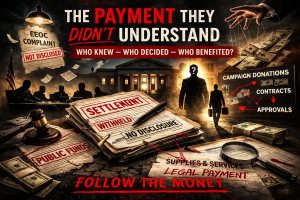The Paper That Prints Lies: The Chronicle-Telegram’s War on One Citizen

May 17, 2025

I. A Pattern of Omission and Obstruction
The Chronicle-Telegram, Lorain County’s flagship daily, has long styled itself as a champion of public accountability. But when the target of public criticism shifts to include the county’s own entrenched actors—like prosecutors, sheriff candidates, and government attorneys—the paper’s editorial compass veers off course. My own experience, as a social worker, journalist, and now candidate for Lorain City Council, offers proof that the Chronicle does not always tell the whole story—especially when it involves me.
Thanks for reading Aaron’s Substack! Subscribe for free to receive new posts and support my work.
Over the past year, I’ve provided Chronicle reporters with exclusive evidence: official complaints, emails, legal filings, and transcripts documenting retaliation by law enforcement, unethical conduct by county prosecutors, and civil rights violations against me and others. Time after time, the paper ignored it. In one such case, I forwarded over 100 pages of documents to David O’Brien, who responded on Dec. 15, 2023: “There appears to be a lot going on here between you and the police department… I’ll be in touch once I get through it.” He never followed up.
I later discovered the Chronicle was simultaneously publishing articles that either omitted my name entirely or distorted facts by excluding comment from me. O’Brien himself emailed on Feb. 14, 2025, to ask for comment about my public records settlement with the county. I responded in full, detailing the legal fees I paid, the basis for my suit, and the county’s admission of wrongdoing. But when the piece ran, it presented my lawsuit as a nuisance claim, with only a partial quote.
“I feel it is necessary to clarify the circumstances surrounding my litigation,” I wrote. “My pursuit of legal action was not initiated by choice but was necessitated by the actions and decisions of Daniel Petticord and other county officials.” That quote never made it to print.
When I challenged O’Brien on February 15 for failing to run my full comments, he claimed he had emailed me the night before at 5:54 p.m. and needed a response by 9 p.m. the same day. “Any thoughts you’d care to share about the settlement?” the email read. Yet I never received that message before publication. O’Brien’s own screenshot later confirmed he had sent it late and never followed up with a phone call, despite having my number.
II. Smearing a Citizen, Shielding the Powerful
Beyond omission, the Chronicle has repeatedly allowed candidates for public office to smear private citizens without accountability. On October 27, 2024, Rich Resendez—an prosecutors Investigator and then-candidate for Lorain County Sheriff—posted a statement on his campaign page directly accusing me, by full name, of defamation and misconduct.
“I continually get slandered by Aaron Knapp, Jeff Gavin (real name Robert Kunsman), Garron Petty, and several others by childish cartoons and memes,” Resendez wrote. He provided no evidence and made no attempt to contact me. I had not posted a single meme about him and was not involved with his opponent’s campaign. In fact, I was a registered Democrat with no formal affiliation to Jack Hall.
Despite this, the Chronicle published Resendez’s statement in full. No fact-check. No request for response. When I asked David O’Brien why my name was being printed as part of a smear without my input, he dismissed my concern with: “Everyone knows ‘George Patton’ is your alias. You say so right on the profile intro.”
Yes, I use an advocacy alias. It’s publicly acknowledged and necessary for my safety, given the harassment I’ve endured from public officials. But using that disclosure to justify the publication of false and reputationally damaging claims reveals the paper’s deeper bias.
I responded to O’Brien by saying: “He has publicly called me out and published my actual name… This is damaging to my reputation.” But instead of retracting the statement or offering me a public correction, O’Brien doubled down on the Chronicle’s indifference.
Even more revealing was O’Brien’s deflection when I said the paper was protecting Resendez. “I’m not backing anyone for sheriff,” he wrote. “That’s up to the Lorain County voters.” Yet it was his editorial decisions that granted a platform to Resendez’s baseless accusations while denying me equal footing.
My emails show I sent multiple requests asking the Chronicle to acknowledge the harm of publishing those accusations. Not once did I receive a substantive response. Meanwhile, O’Brien continued to engage with Resendez as a source, even as Resendez used his government position to attack private citizens.
The Chronicle failed its readers and its ethics code. It printed a direct accusation against a private individual, made by a candidate who holds a investigative position of power, without verifying the claim or offering a platform for response. In doing so, it endorsed the misuse of a political platform to suppress dissent.
That failure is not just a lapse in journalistic rigor—it’s a warning sign of deeper institutional bias, one that serves power over people.
III. The Ethics of Exclusion: When the Chronicle Abandons Fair Reporting
Few episodes illustrate the Chronicle’s abandonment of ethical journalism more clearly than its coverage of the Tia Hilton protection order and the accusations posted by Rich Resendez. In both cases, Chronicle reporters selectively printed allegations while omitting verifiable counterevidence that had been filed in court or submitted directly to the newsroom.
Carissa Woytach contacted me immediately after Hilton’s TPO was filed, asking: “Do you have any comment on Ms. Hilton’s allegations?” I replied promptly, telling her I had filed a reciprocal protection order, with over 50 pages of exhibits disproving Hilton’s claims. I warned, “If you are just going offer the petitioner’s filing your story will be factually inaccurate.” Yet the Chronicle’s story made no mention of my response or counterfiling.
Despite providing a court-stamped response and detailed counterclaim, the Chronicle ran with the narrative of accusation, not context. My follow-up email warned clearly: “If you are just going off the petitioner’s filing your story will be factually inaccurate.” I even CC’d my attorney, Robert Gargasz, to confirm.
In the case of Rich Resendez, who publicly accused me of “continually slandering” him via Facebook, the Chronicle printed his quote without contacting me for a response or asking him for evidence. When I pressed David O’Brien, he deflected: “Everyone knows ‘George Patton’ is your alias.” That may be true, but it’s irrelevant to my right to comment on a defamatory accusation published by a sitting Investigator for the County Prosecutor.
Both Resendez and Hilton are political insiders. Both accused a private citizen—me—without evidence. And in both cases, the Chronicle acted as a megaphone, not a filter. That violates not just common sense, but basic journalism ethics.
According to the SPJ Code of Ethics, reporters should “take special care not to misrepresent or oversimplify in promoting, previewing or summarizing a story.” The Chronicle’s conduct runs counter to that guideline, regularly promoting a narrative that favors power over fairness.
This is more than an editorial error. It’s a systemic failure to uphold the obligation to accuracy and impartiality. Publishing claims without verifying them—and ignoring documents that contradict those claims—puts the Chronicle in dangerous legal and ethical territory.
In an age where defamation law is clear and the standards for negligence are well-established (see New York Times Co. v. Sullivan), the paper’s willful disregard of rebuttals and refusal to include opposing facts shows actual malice or at minimum, reckless disregard for the truth.
When a publication consistently protects government officials and silences dissenting voices, it has ceased to be a neutral observer. It has become a gatekeeper.
And when that gatekeeping harms reputations, endangers truth, and enables institutional abuse, it’s not just a press problem—it’s a democracy problem.
IV. Seven Stories, Zero Balance
Despite the Chronicle-Telegram’s repeated claim that it does not endorse candidates or participate in political mudslinging, its editorial choices tell another story—one in which I have appeared in the paper at least seven times over the past year, and almost exclusively in a negative or adversarial light.
The first article tied me to an incident at Lorain City Hall in which I was labeled as disruptive for asking to see public records. The article quoted city officials but failed to include the context I provided in my official complaint. Then came the piece on the public records lawsuit I filed—describing it as a “dispute” rather than a legal win. A third article reported on the TPO filed by Hilton, with no mention of my court-filed rebuttal or counter-allegations.
A fourth mention appeared when David O’Brien asked me for a quote about the county’s delayed video release. I provided a full written statement detailing the timeline, legal citations, and personal costs. But the paper published only a single sentence. A fifth reference came when O’Brien wrote about my political commentary under the George Patton alias—without noting that my advocacy has been protected speech.
The sixth came when I was mentioned by name in Rich Resendez’s published campaign statement, where he accused me of slander. Again, the Chronicle printed the accusation without a single question or verification. No call, no email, no comment from me.
Now a seventh mention has surfaced—this time in the form of an editorial blurb referencing me without offering an opportunity for clarification or rebuttal. It stated: “Knapp, a frequent critic of Lorain city and county officials, filed a flurry of lawsuits and public records complaints in 2024 and 2025, often naming prosecutors or judges. At least one resulted in a modest settlement, though the county did not admit wrongdoing.”
That sentence, nestled in a wider editorial piece, reinforced the image of me as a litigious agitator—never mind that I had won multiple public records disputes and never sought monetary damages. The Chronicle also failed to mention that even Prosecutor J.D. Tomlinson acknowledged the legitimacy of some of my concerns in internal correspondence.
When I asked David O’Brien about this lack of balance, he simply replied: “If you file a complaint or legal action, let us know and we’ll write about it.” In other words, unless I take on the burden of a lawsuit or public scandal, the paper won’t acknowledge me.
This practice amounts to selective engagement—where powerful voices are given microphones and critical voices are muted unless they erupt into full-blown controversy. It’s not journalism; it’s institutional gatekeeping.
The Chronicle’s editorial bias becomes especially apparent when placed against its silence on verifiable stories I’ve brought to them—stories involving confirmed retaliation, misused authority, or public funds mismanagement. Their disinterest isn’t neutral—it’s a choice.
And for a newspaper that claims to serve the public interest, that’s a betrayal of its most basic duty: to inform without bias and to give the voiceless a chance to speak.
V. A Broader Pattern: Chronicle Bias in Lorain County Politics
To understand how the Chronicle-Telegram has treated me, it’s helpful to step back and examine its broader editorial pattern—especially in Lorain County’s political contests. While the paper purports to remain neutral, its coverage tells a different story. Over the past decade, and most noticeably during the 2024 sheriff’s race between Jack Hall and Rich Resendez, the Chronicle has displayed a subtle but persistent editorial tilt that protects insiders and disfavors challengers.
During the Hall-Resendez race, for instance, the Chronicle’s tone consistently favored Resendez. It printed Resendez’s campaign statements—including false accusations against private citizens like myself—without pushback, while Hall received harsher scrutiny for more routine campaign matters. Editorial coverage of Resendez often emphasized his credentials in the prosecutor’s office and military service, while any mention of criticism—like his refusal to publicly debate Hall—was buried or left unreported.
Meanwhile, Hall’s candidacy was framed through the lens of association. Articles often brought up his past involvement in internal disputes at the sheriff’s department, even when irrelevant to the campaign. When Hall won the election in November 2024, the Chronicle acknowledged the result but offered no analysis of why voters chose him over a sitting prosecutor’s candidate—nor did it examine why so many residents had grown distrustful of the prosecutor’s office.
Looking back further, this trend of selective elevation and suppression is clear. Candidates who have had close ties to county government, including several assistant prosecutors and longtime incumbents, consistently receive more favorable or sanitized coverage. Opponents or outsider candidates—especially those who challenge structural authority—are either ignored or framed as combative.
Take Michelle Hung’s tenure. While Hung has been a controversial figure in county politics, her critical role in exposing the ERA settlement cover-up was downplayed by the Chronicle. They mentioned her only briefly in articles about the scandal, focusing instead on administrative procedures or downplaying the implications of a secret six-figure payout to a politically connected staffer.
Similarly, the paper rarely scrutinized Law Director Dan Petticord, despite clear evidence of conflicting roles and contradictory deposition testimony. Petticord has acted as a shield for numerous public actors, including denying my public records requests—yet the Chronicle has published virtually nothing critical about him, even when ethics complaints were filed.
In contrast, community advocates and outsider candidates have been portrayed in a negative light. Myself, Garon Petty, and others who have pushed for transparency and accountability have either been ignored or reduced to footnotes in articles about disputes. When covered, our motives are questioned, and our complaints described as “frequent” or “disruptive”—words never used for entrenched political actors.
The editorial slant becomes especially glaring when viewed against the backdrop of national journalism trends. At a time when trust in media is declining and polarization is increasing, local papers like the Chronicle have a duty to present facts without favor. Yet in Lorain County, the Chronicle seems to consistently err in favor of incumbency, authority, and institutional power.
This is not just a matter of tone or preference. It’s about access, representation, and fairness. When a paper elevates one side of the political spectrum while downplaying the other—when it prints accusations but withholds rebuttals—it becomes a participant in the very political drama it should be covering.
The Chronicle-Telegram’s reporting, especially in recent years, reveals more than editorial discretion—it reveals editorial direction. And in Lorain County, that direction too often points away from the truth.
VI. Copyright and Control: Is the Chronicle Losing Its Grip?
In recent months, whispers across Lorain County’s civic forums and social media groups have revealed a new, troubling development in the Chronicle-Telegram’s relationship with the public: alleged threats of litigation over copyright claims. According to multiple reports online, Chronicle Editor Julie Wallace has warned critics and independent journalists that reposting screenshots of Chronicle headlines, quotes, or article snippets may result in legal action for copyright infringement.
It’s a heavy-handed tactic—and legally dubious. Under federal copyright law, 17 U.S. Code § 107 outlines the doctrine of “fair use,” which allows limited use of copyrighted material without permission for purposes such as criticism, comment, news reporting, teaching, scholarship, and research. Reposting part of a headline, a quote from an article, or even an excerpted paragraph as part of a political critique falls squarely within those protections.
The First Amendment adds another layer of protection. Citizens have a constitutional right to criticize the press, especially when that press shapes public opinion about elected officials, candidates, and community advocates. Copyright law was never intended to shield media outlets from accountability or public scrutiny.
So why, then, has the Chronicle begun threatening legal action against citizens who repost their own coverage? The answer may lie in the paper’s declining influence. In 2024, the Chronicle reduced its print schedule from six days to four, citing the shift to digital media and budgetary constraints. That same year, online subscriptions plateaued and community trust—according to reader comments—was waning.
At the same time, independent news voices and civic watchdogs like myself, Lorain Daily, Garon Petty, Jon Morrow, Jayne Morales, Lorraine Ritchey, and others have launched efforts to bring local news directly to the people in digital, easy-to-consume formats. These platforms are not locked behind paywalls and prioritize transparency over editorial gatekeeping.
Whether by posting corrections, uploading public records, or sharing screenshots of biased articles, we’ve built a parallel record of the Chronicle’s selective silence and editorial favoritism. Now, with the Chronicle trying to pivot online while retaining its traditional authority, its editorial team seems more focused on maintaining control than fostering transparency. Their weapon of choice isn’t dialogue or reform—it’s the implied threat of legal retaliation against critics.
The irony is stark. A newspaper that regularly publishes criminal charges, controversial filings, and one-sided accusations now claims copyright when someone reposts the article to add context or criticism. It’s a double standard: They publish, you’re not allowed to respond.
This isn’t just a legal question—it’s a moral one. What does it say about a news organization that chooses to intimidate its critics rather than engage them? What kind of Fourth Estate retreats behind copyright warnings when faced with public demand for fairness?
In a healthier media ecosystem, scrutiny would be welcomed, not suppressed. But in Lorain County, the Chronicle’s retreat into copyright threats is not a sign of strength. It’s a sign of desperation.
And the public sees it. When newspapers stop asking questions and start sending warnings, they lose more than subscribers. They lose the trust that journalism is built on.
In recent months, the Chronicle’s editorial grip has faced a direct challenge—not from rival papers, but from citizens armed with smartphones, public records, and free speech. Pages like Lorraine Ritchey’s “Lorain City Politics” continue to gain traction for real-time accountability. Her long-standing blog, That Woman, chronicles Lorain’s political dysfunction and media failures with historical depth and consistency. Jon Morrow’s Substack has become a repository for court documents and campaign filings the Chronicle won’t touch. Garon Petty has preserved years’ worth of public meetings on video—many of which were abruptly purged from the city’s website without explanation. These platforms are grassroots checks on institutional silence.
Other digital disruptors are stepping up as well. The Jones brothers, with their news platforms Lorain Daily and Vermilion Daily, have introduced timely, independent news coverage with open access and community-driven reporting. Their commitment to transparency and accessibility is redefining how local stories are told—without fear or favoritism.
In a time when democracy demands more engagement—not less—the Chronicle’s apparent choice to litigate rather than participate tells us everything about whose voice they value. It’s not the public’s.
VII. Eroding Trust: How the Chronicle’s Bias Damages Democracy
The credibility of a local newspaper is built on the public’s trust that it will inform rather than mislead, question power rather than protect it, and reflect the full spectrum of voices in its community. But in Lorain County, the Chronicle-Telegram appears increasingly committed to a narrower agenda—one that favors its allies and marginalizes its critics. This erosion of journalistic neutrality has real consequences for civic engagement, government transparency, and public accountability.
Time and again, the Chronicle has framed stories in ways that amplify the voices of political insiders while downplaying or ignoring opposing perspectives. The 2024–2025 sheriff’s race offers a textbook example. While challenger Jack Hall faced aggressive scrutiny, the Chronicle provided a platform to Assistant Prosecutor Rich Resendez, allowing him to issue statements—some demonstrably false—without balanced fact-checking or equal space for rebuttal. In one editorial, the paper echoed Resendez’s accusations against me, a private citizen, without ever reaching out for clarification or comment.
This is not an isolated misstep. As documented in previous sections, I’ve been featured or mentioned in Chronicle reporting at least seven times—each instance lacking proper context, with misleading summaries or outright inaccuracies. No effort was made to fact-check with me, despite my frequent availability. No clarification was printed. My name was used, but my voice was not.
The damage doesn’t stop at reputation. This type of coverage reinforces a climate of fear and political retaliation. Candidates and activists who dare to challenge entrenched figures risk being misrepresented in print while their opponents are granted uncritical editorial space. The message is clear: stay in line or be vilified.
Ironically, the Chronicle’s own editorial board has criticized politicians for “refusing to answer tough questions.” Yet when citizens pose those same questions to the paper—about sourcing, bias, or access—there is only silence or defensiveness. It’s a form of civic hypocrisy: demand transparency from public servants, but deny it as a media institution.
Worse still, the paper appears to reward compliance. Those who align with the political preferences of the newsroom or editorial board often receive favorable profiles, glowing endorsements, and the benefit of doubt. Dissenters get dismissal. Controversial issues, such as school policy failures, juvenile justice disparities, or public records denials, are routinely underreported unless the narrative suits the paper’s leanings.
This trend is not only unethical—it’s dangerous. Journalism serves as the fourth estate precisely because it acts as a check on all three branches of power. When a paper picks sides instead of covering all sides, it becomes a stakeholder in the outcomes it’s supposed to report on impartially. And when that happens, the public loses its watchdog and is left with a megaphone for the politically connected.
I’m not the only one who sees this. Citizens are turning to other sources—blogs, podcasts, livestreams, and online archives—to find what the Chronicle omits. Trust, once lost, is not easily recovered. The community is building a new media landscape not because it wants to—but because it has to.
The Chronicle-Telegram has the resources and reach to do better. It could reform its editorial process, commit to real neutrality, and foster public trust by covering the full truth. But until it chooses that path, it will remain part of the problem—an institution more interested in control than in clarity.
And Lorain County deserves better.
Final Thought: Journalism or Justification?
When we speak of the press as the Fourth Estate, we’re talking about its sacred duty to inform the public—not to insulate power or weaponize its pages against dissent. The Chronicle-Telegram, once a pillar of Lorain County’s civic life, has devolved into a platform that privileges insider narratives and silences those who challenge the status quo.
My name has appeared in Chronicle coverage seven times. Not once was I offered a fair, balanced chance to explain my side before publication. Not once did the editors acknowledge my replies. Not once did they update stories when facts changed. Yet these stories remain online, uncorrected, used as weapons by my critics and detractors, amplified by algorithms and assumptions.
This isn’t journalism—it’s justification. A justification of institutional bias. A justification of partisan positioning. A justification of the continued erosion of public faith in local media.
The Chronicle has proven it can act as an amplifier of prosecution narratives, as in the Resendez/Hall race, where claims were treated as facts and rebuttals omitted. It has shown favoritism through editorial space, publishing some names repeatedly while dismissing others entirely. And now it is entering the terrain of copyright suppression—an effort to maintain control in a time when that control is slipping.
But this isn’t just about one person. It’s not about Aaron Knapp. It’s about every citizen who wants a government that tells the truth, a press that asks the hard questions, and a community that is allowed to participate in the process of accountability.
We’ve entered a new era of civic journalism, and the Chronicle has a choice: evolve and embrace transparency—or retreat into irrelevance. I, for one, won’t be bullied, blacklisted, or silenced. And neither should you.
Lorain deserves better. So do its people. And if the Chronicle won’t deliver it, we will.
Legal Disclaimer
This op-ed reflects the personal views and experiences of the author, Aaron Christopher Knapp, and is intended for informational and commentary purposes only. All factual claims are supported by publicly available records, direct correspondence, or previously published media. Allegations of bias, misconduct, or wrongdoing are based on documented interactions, verified communications, and the author’s lawful right to critique matters of public concern.
Any quoted material from The Chronicle-Telegram or affiliated individuals is cited under the doctrine of Fair Use as outlined in 17 U.S.C. § 107, which permits limited use of copyrighted content for purposes such as criticism, commentary, news reporting, and public interest discourse. This article does not reproduce Chronicle content in full, does not harm the commercial value of the original works, and is published in the spirit of transparency and civic accountability.
All statements herein are made in good faith and with no malice. Any individual or institution named is welcome to submit a rebuttal, clarification, or correction. The author has made reasonable efforts to verify the accuracy of claims and welcomes any legal or journalistic response made in the same spirit of openness.
This article is not affiliated with any political campaign, law firm, or media competitor of The Chronicle-Telegram. It is protected speech under the First Amendment of the United States Constitution.
*Edit a previous version of this story listed Rick Resendez as an Assistant Prosecutor, it has been corrected to read “Investigator”




